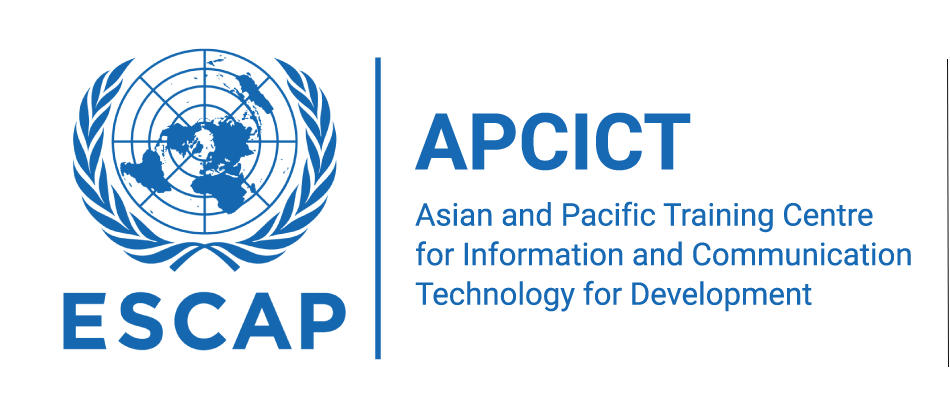- What is the Academy of ICT Essentials for Government Leaders?
- Who is the Academy targeting?
- What specifically is the content of each module?
- How will the Academy’s training modules be delivered and what are some of the special features of these modules?
- What accompanying resources will be offered by the Academy?
- Are there plans to translate the modules?
- Will those who have undergone training receiving any certificate of attendance?
What is the Academy of ICT Essentials for Government Leaders?
The ‘Academy of ICT Essentials for Government Leaders’ (Academy) is APCICT’s first flagship programme launched in June 2008 on the occasion of the Global Forum for Building Inclusive Internet Economy during the OECD ICT Ministerial Meeting. The Academy includes a comprehensive curriculum comprised a variety of stand-alone yet inter-linked modules that range from foundational to advanced topics in the field of ICT for development (ICTD). The Academy has been rolled out, adopted and institutionalized in 36 countries of the Asia-Pacific region and is currently available either partly or fully in sixteen languages. Localization into other languages is also underway.
Introductory Modules
- ICT for Development Policy, Process and Governance
- e-Government Applications
- An Overview of ICTs and Sustainable Development
Managerial Modules
- Options for Funding ICT for Development
- ICT for Disaster Risk Management
Technical Modules
- Information Security and Privacy
- ICT Project Management in Theory and Practice
- Internet Governance
Thematic Modules
- Social Media for Development
- ICT, Climate Change and Green Growth
M&E Module
- M&E Toolkit - Monitoring and Evaluation Toolkit
Past Modules
- ICT Trends for Government Leaders
- The Linkage between ICT Applications and Meaningful Development
The content of the modules is mostly non-technical in nature. The extensible modular design aims to maximize flexibility and minimize job disruptions for learners. The modules can therefore be selected for delivery on the basis of needs and skills of the learners. Those with little or no background in ICTD can choose the pre-determined sequence of comprehensive training that begins with the basics and move on to more advanced topics. Those with some knowledge of ICTD can select specific modules they would benefit from most.
Who is the Academy targeting?
The Academy is targeted primarily at policymakers and government officials developing and implementing ICT-based applications. Specifically, the modules target:
- Policymakers at the national and local government level who are responsible for ICT policy-making;
- Government officials responsible for the development and implementation of ICT-based applications;
- Managers in the public sector seeking to employ ICT tools for project management; and
- Trainers and educators in ICT training institutes, colleges and universities.
The modules are written according to the principles of adult learning. It is recognized that adults learn best when they are free from stress, information overload, and are able to themselves decide what is important to be learned. The self-study questions and practical exercises contained in all modules are designed to enable readers to draw on their own experience to benchmark the content and to think reflectively on the issues presented.
The aim is to make the content as closely relevant to the readers work experience as possible and to enable readers to link the knowledge gained to their own experience in order to solve problems. It is recognized that the users of these modules will have a significant ability to serve as knowledgeable resources themselves in training and learning situations.
Trainers and educators using the modules in training institutions, colleges and universities can use some or all of the modules as provided, add them to their existing training programme(s), and/or modify them to fit learners’ needs.
What specifically is the content of each module?
Introductory
ICT for Development Policy, Process and Governance
While ICT holds promise for impacting socio-economic development, implementation of ICT applications does not guarantee sustainable development. This module provides critical information about different aspects of national policies and strategies that promote ICTD. It will also discuss ICT governance and management.
e-Government Applications
In this module, readers will learn about the current ICT applications that are important for policy makers and other government officials. In particular, the module will include a case study of each application to see the potential impact of each type, important success factors, and common barriers to achieving success for each type of application.
Managerial
Options for Funding ICT for Development
While ICT projects can often be expensive, there are several sources of funding that governments can tap into as they seek to develop the Information Society. This module provides information to readers on where they can look for funding, how to write proposals to gain access to these sources of funds, and how current projects are being funded and the outcomes of these projects.
ICT for Disaster Risk Reduction
The module provides government officials and policymakers with an overview of disaster risk management (DRM), presents an approach for identifying information needs in DRM and matching the needs with ICT. The module also aims to familiarize learners with existing ICT applications for DRM and discusses benefits and barriers for utilizing ICT in DRM efforts.
Technical
Network and Information Security and Privacy
As ICT becomes more prevalent in today’s highly networked world, policy makers and other government officials need to consider the issues related to information security to establish the relevant ICT related policies. This module provides, in a non-technical way, a high-level understanding of the current threats to ICT security and the safeguards governments need to take to ensure secure ICT systems. The module also introduces the examples of developed economies and the international trends of information security and practical steps to adopt in the mitigation of cyber threats.
ICT Project Management in Theory and Practice
This module provides an overview on ICT Project Management in the context of national development needs and priorities and it provides an introduction on ICT Project Management concepts, tools, and practices. The module also provides an introduction to the various techniques, and software tools needed to better manage ICT projects.
Internet Governance
This module examines the on-going development of international policies and procedures that govern the use and operation of the Internet. Governments of emerging economies need to understand these issues if they are to have a voice in the global information network.
Thematic
Social Media for Development
This module provides a development-oriented perspective on social media and describes innovative ways for governments and development stakeholders to leverage it in national development strategies and programmes.
ICT, Climate Change and Green Growth
The module provides policymakers with an understanding of the role that ICTs play in observing and monitoring the environment, sharing information, mobilizing action, enhancing decision making, promoting environmental sustainability and abating climate change. The module also explores the potential of ICT to transform the economy into an engine for sustainable “green” growth, while integrating ICT into such an economy.
Past Modules
ICT Trends for Government Leaders
This module seeks to provide an appreciation and understanding on the evolution of ICT and the part it plays in today's dynamic global environment. It provides an overview on the key components of ICT infrastructure, and policy and technical considerations associated with it. It discusses current and emerging technologies and the impact of such technologies at the national and regional level. It also provides an overview of key policy and implementation considerations necessary to make effective decisions at the local/national level. The module elaborates on methods to critically evaluate the status of ICT infrastructure and policy issues based on current and emerging technologies to enable informed choices to be made.
The Linkage between ICT Applications and Development
In this module, readers will learn about the potential for using ICT for social and economic progress. The module provides useful information that can be used to justify specific ICT-based projects and will help policy makers prioritize specific uses of ICTD.
How will the Academy’s training modules be delivered and what are some of the special features of these modules?
The modules are designed to have value for different sets of audiences and in varied and changing national conditions. They have been designed in such a way that they can be used for self-study by individual readers or as a resource in a training course or programme.
The modules are standalone as well as linked together. They can be studied in whole or in part, in different modes, on- and off-line.
All modules include case- and country-studies that can be changed from region to region and from country to country to suit local situations. There are exercises and questions to help readers check for themselves that they have understood the discussion. References, further readings, and online resources are listed for readers to look up in order to gain additional perspectives.
When offered in formal training sessions, whether in training institutions or government offices, the duration of the training sessions for each module can be adjusted depending on the target audience and the extent of detail that is requires in the presentation of content. Depending on the module involved, in a face-to-face “classroom” setting, the content of the modules can be presented in week-long, three-day, one-day, or three-hour sessions. The sessions lasting three days or more include lecture cum discussion, a field visit, and practical exercises, with each exercise building on the previous one.
APCICT will establish partnerships with national and sub-regional institutions, focusing initially on “UN-ESCAP High Priority Countries”, in order to offer the Academy of ICT Essentials modular programme locally. These partnerships are envisioned to be collaborative arrangements where APCICT and the partner institutions work together to build the capacity of local and national governments and public institutions to effectively utilize ICT to foster good governance and achieve broad social and economic development.
The modules are offered as open educational resources (OER).
National and regional training institutions that are already networked with central-, state- and local-level governments to provide short-term training for senior- and middle-level government leaders, and are committed to enhancing their capacity in ICTD, could partner with APCICT in delivering and customizing the modules. APCICT will provide select training institutions with content of the modules, along with all accompany materials including reading lists and case studies. Subject to funding availability, APCICT can also provide an orientation to the Academy and hands-on training for trainers.
What accompanying resources are offered by the Academy?
Supporting the Academy is an online distance learning platform (the APCICT Virtual Academy). On the APCICT Virtual Academy , all course materials will be posted for free download and re-use, and for customization and localization if necessary. A DVD-ROM version of AVA will be produced for those with no or limited Internet access.
The ICTD InfoBank is an online collaboration workspace in which participants can share and discuss ICTD topics, and even work together to customize an existing module or develop a new one. For learners and trainers who wish to read more about a particular topic, they will be able to access the online resource centre at e-Collaborative Hub.
Are there plans to translate the modules?
In collaboration with national Academy partners, APCICT has already translated the modules into multiple languages, including Azeri, Bahasa Indonesia, Khmer (Cambodia), Mongolian, Myanmar, Pashto, Russian, Tajik and Vietnamese. APCICT is also working with its partners to develop plans to translate the Academy into additional languages.
Will those who have undergone training receiving any certificate of attendance?
APCICT and/or its local Academy at the national or sub-regional level, will provide each participant of one its training programme’s with a certificate of participation. Participants are expected to attend all the sessions of the course in order to obtain the certificate.
Additionally, it is possible to receive a certificate of completion of each of the module by completing the corresponding course on APCICT Virtual Academy (AVA), the online distance learning platform of APCICT.


